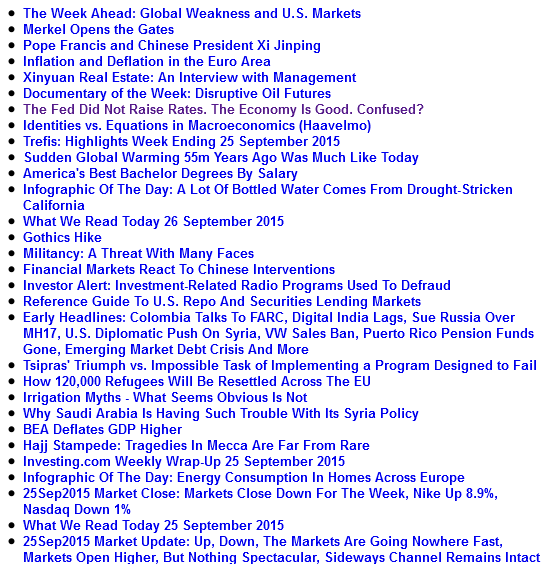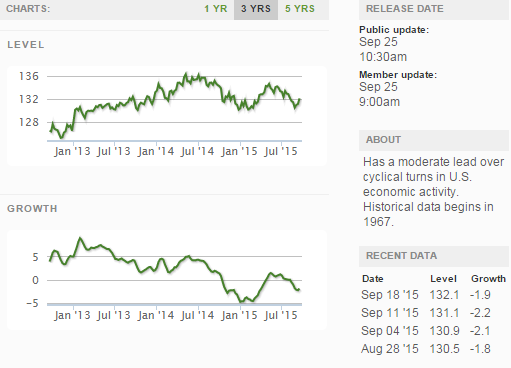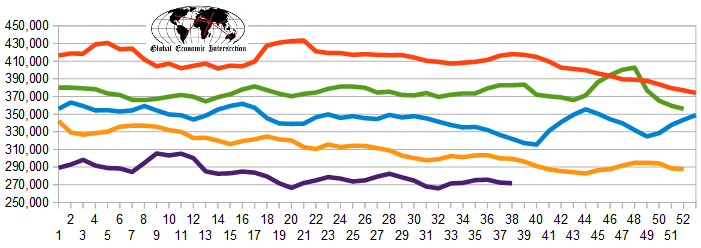My weekend economic summaries try to put current economic events into perspective. I purposely give higher weight to the information coming from the Federal Open Market Committee (FOMC) - as they are the controllers of monetary policy. The Federal Funds Rate influences the interest rates in the USA. The FOMC says the economy is moderately expanding, yet has not raised the prime rate for years (or decades depending on how you are counting).
Follow up:
The FOMC continues to talk up the economy. From their recent statement:
Information received since the Federal Open Market Committee met in July suggests that economic activity is expanding at a moderate pace. Household spending and business fixed investment have been increasing moderately, and the housing sector has improved further; however, net exports have been soft. The labor market continued to improve, with solid job gains and declining unemployment. On balance, labor market indicators show that underutilization of labor resources has diminished since early this year. Inflation has continued to run below the Committee's longer-run objective, partly reflecting declines in energy prices and in prices of non-energy imports. Market-based measures of inflation compensation moved lower; survey-based measures of longer-term inflation expectations have remained stable.
The gist of this statement is that the economy is fine. Employment continues to grow. But inflation is too low BUT long term inflation expectations are good. The FOMC continued:
Consistent with its statutory mandate, the Committee seeks to foster maximum employment and price stability. Recent global economic and financial developments may restrain economic activity somewhat and are likely to put further downward pressure on inflation in the near term. Nonetheless, the Committee expects that, with appropriate policy accommodation, economic activity will expand at a moderate pace, with labor market indicators continuing to move toward levels the Committee judges consistent with its dual mandate. The Committee continues to see the risks to the outlook for economic activity and the labor market as nearly balanced but is monitoring developments abroad. Inflation is anticipated to remain near its recent low level in the near term but the Committee expects inflation to rise gradually toward 2 percent over the medium term as the labor market improves further and the transitory effects of declines in energy and import prices dissipate. The Committee continues to monitor inflation developments closely.
Monetary policy is forward looking. Regardless of pundits insinuating otherwise, it takes months for the effects of monetary policy to work its way into the economy. A small adjustment in monetary policy would be symbolic as its effect could not be isolated amongst the millions of other dynamics also acting on the economy. What the FOMC must avoid is raising rates coincident with economic dynamics exerting downward pressure on the economy. Pundits will blame any economic decline on their rate increase.
So is the FOMC is misleading the world on the state of the USA economy? Does the FOMC see an economic soft spot? If I can easily see an economic soft spot coming, they can see also. The issue is NOT inflation as highlighted, but economic performance. You will never see blunt words from the FOMC stating the economy is slowing. After all, can you imagine the market's reaction if the FOMC said the economy was slowing - and that was the reason they are not raising the Federal Funds Rate?
There are four analytically based forward looking economic indicators - The Conference Board's Leading Economic Index, ECRI's Weekly Leading Index, the Chemical Activity Barometer, and the Leading Index of the United States. These indices forecast the economy six months (or more in the case of the Chemical Activity Barometer) in the future. Most other economic forecasts are non-analytical guesses.
My least favorite economic forecast of all is the Leading Index of the United States as it is significantly and constantly being recalculated. At this moment, this index is forecasting relatively weak but stable growth over the next six months.
The Chemical Activity Barometer was released this week dropped 0.4 percent in September, following a revised 0.2 percent decline in August.
"The pattern shows a marked deceleration, even reversal, over second quarter activity. It is unlikely that growth will pick up through early 2016."
ECRI's WLI Growth Index, which is issued weekly, slid insignificantly further into negative territory. This index had spent 28 weeks in negative territory then 15 weeks in positive territory - and now is in its sixth week in negative territory.
The Conference Board Leading Economic Index (LEI) for the U.S. marginally improved in its most recent release - but the authors believe the outlook
"suggests economic growth will remain moderate into the New Year, with little reason to expect growth to pick up substantially".
If I were a member of the FOMC, I would have voted against raising the Federal Funds Rate. The timing was correct one year ago - but it is not politically correct now.
Other Economic News this Week:
The Econintersect Economic Index for September 2015 improved from last month's lowest index level since April 2010. The tracked sectors of the economy generally improved somewhat or the growth remained unchanged. Still, our economic index has been in a long term decline since late 2014.
The ECRI WLI growth index is now in positive territory but still indicates the economy will have little growth 6 months from today.
Current ECRI WLI Growth Index
The market was expecting the weekly initial unemployment claims at 269,000 to 280,000 (consensus 275,000) vs the 267,000 reported. The more important (because of the volatility in the weekly reported claims and seasonality errors in adjusting the data) 4 week moving average moved from 272,500 (reported last week as 272,500) to 271,750. The rolling averages generally have been equal to or under 300,000 since August 2014.
Weekly Initial Unemployment Claims - 4 Week Average - Seasonally Adjusted - 2011 (red line), 2012 (green line), 2013 (blue line), 2014 (orange line), 2015 (violet line)
Bankruptcies this Week: HII Technologies
Click here to view the scorecard table below with active hyperlinks
Weekly Economic Release Scorecard:



